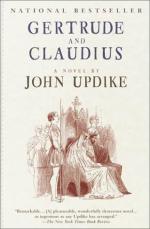|
This section contains 658 words (approx. 2 pages at 400 words per page) |

|
Several of Updike's novels, and his play Buchanan Dying, speak to his growing interest in the literary and cultural history that contributes to our modern experience. He has never, however, reached so far back into literary history, and only a few writers have had the audacity to re-write the narratives of the masters. His retrospective narratives have generally been confined to the American experience of the past two centuries, except for the fragments of historical narrative about Egyptian grave-robbers and the Norse invasion of an English monastery in Toward the End of Time (1997). Two additional literary and cinematic phenomena provide a context for Updike's approaching Shakespeare to re-cast and reinterpret one of our culture's widely-accepted core narratives.
First, the final decade of the twentieth century witnessed a resurgence of Shakespearean drama adaptations into commercial films. Kenneth Branagh (to whose 1996 "four-hour film" version of Hamlet Updike attributes...
|
This section contains 658 words (approx. 2 pages at 400 words per page) |

|




